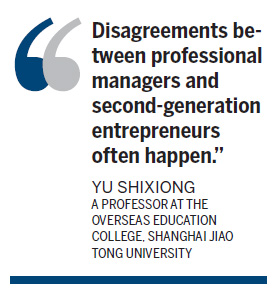Family business difficult to sell
Updated: 2011-12-13 10:28
By Zheng Xin, Yu Ran and Diao Ying (China Daily)
|
|||||||||||
BEIJING / SHANGHAI - The father buys, the son builds, the grandchild sells and his son begs. So goes the saying that describes how family-run businesses evolve.
|
 |
But forget the grandchild and his son. For most first-generation entrepreneurs on the Chinese mainland, the headache is that their children will not build on their success, according to a survey.
Of 2,093 family businesses surveyed, 73.7 percent of owners were unwilling to pass the baton to the next generation, while 50.5 percent of the rich second generation are reluctant to run the family business, according to the Chinese Family Business Report.
The report was carried out by the All-China Federation of Industry and Commerce, the National Center for Private Economy Studies, the Research Centre for Chinese Family Firm and the Department of Family Business and Business History at Zhejiang University.
Li Da, an entrepreneur from Wenzhou, Zhejiang province, opened a bakery in his hometown instead of inheriting his father's cigarette lighter company that was founded in the 1980s.
"My father's 20-year-old company has a set business model where I have no chance to apply my talent," said the 24-year-old, who discovered an interest in baking as a student while working part time in a bakery in Paris.
"I want to bring original French pastry to local customers instead of working in a sun-setting industry."
Li Da's father, Li Zhongjian, said he was happy to see his son start his own business.
"It has become common for the younger generation to refuse to inherit the family enterprise, which I understand."
Chen Ling, a professor at the Department of Family Business and Business History at Zhejiang University, said businesses created by China's first-generation entrepreneurs are faced with a "to be or not to be" situation.
"Chinese family businesses, mostly in the low-end manufacturing sector, may be acquired or just simply die out," Chen said.
This predicament prevented the younger generation from taking the reins.
According to Chen, the next five to 10 years will witness a boom in the transfer of family wealth, since the founders, mostly in their 50s, will retire in their 60s.
Some first-generation entrepreneurs hired professional managers to help their children. But this is not an easy or even popular option.
According to the report, only 7.9 percent of CEOs interviewed were willing to hire professional managers, with 55.9 percent complaining about difficulty in finding suitable candidates and 34.6 percent citing the high cost.
Other reasons cited included an issue of trust and legal protection.
"Disagreements between professional managers and second-generation entrepreneurs often happen," said Yu Shixiong, a professor at the Overseas Education College, Shanghai Jiao Tong University. "It's not unusual for professional managers in family businesses to take up the role of an assistant instead of a decision-making role."
One executive of a business that has been going for more than a century admitted that passing the baton to the children and grandchildren is challenging.
Sammy W. S. Lee, chairman of Hong Kong-based Lee Kum Kee, said "different life experiences and values" may be the reason.
Lee worked in the business that his great-grandfather started the century before last, as his father and grandfather did. The food company started from manufacturing oyster-flavored sauce in 1888 and has witnessed four generations since then.
"It's more challenging to carry forward an industry than building one," Lee said.
But he believed family businesses can thrive through the generations and he said he will pass the baton onto his children.
Some experts also said the father-to-son mode has proven its vitality in Hong Kong.
Victor Zheng, associate director of the Centre for Social and Political Development Studies at the Chinese University of Hong Kong, noted that Hong Kong has a long history of family-controlled firms. The first generation of entrepreneurs in Hong Kong often sent their children abroad, to receive an advanced education at a very early age.
Zheng said that when the children returned, to eventually lead the family business, they needed to start from scratch learning to communicate with other staff and work with them. In the process, they had to establish their own authority.
"They worked hard during that time and dealt with many difficulties and had to build relationships with business partners of their parents," Zheng said.
He stressed that mainland successors of family firms can learn from the experience of Hong Kong.
According to the report, family businesses on the Chinese mainland, mostly small and medium enterprises located in the eastern coastal provinces, are still in the early stage of growth.
However, the family business accounts for 90 percent of the private economic production on the mainland and contributes more than 50 percent to the mainland's GDP, according to Huang Mengfu, chairman of All-China Federation of Industry and Commerce.
Fan Feifei in Hong Kong contributed to this story.
Related Stories
Behind the scenes with Laker Girl 2011-02-18 08:15
Daughter, son try to fill dad's shoes 2011-04-04 15:35
- Industries to remain world's most competitive
- Watsons to open 2,000 stores in five years
- Fears from offshore yuan use overblown
- China's slice of export pie may shrink
- Banks pushing to maximize lending
- Beijing plans cloud computing hub
- Putting high-speed travel back
- School bus safety rules set standards








